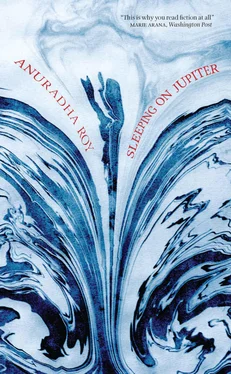“That picture is of a sculpture from an ancient temple’s wall. Do you know how old?”
I shook my head.
“Nine hundred years. Can you see what the woman in the sculpture is doing?”
A nine-hundred-year-old woman. I stared at the picture. She had big, curved eyes and plump, curved lips and she was sitting at the feet of the man in the sculpture. Her fingers were as long as pencils. They were holding the cucumber between the man’s legs just as I had been a few minutes ago.
Guruji hung a fresh towel from the cupboard on that peg. The picture was hidden again. I felt his hand caressing my head. “Go for lunch,” he said. “Say nothing. I do not reveal myself in this form to anyone else. You are the chosen one. Not a word about this. I will call you and you will sit on my lap again.”
I left his room. I scrubbed my hands at the kitchen tap for a long time, but I could not help feeling they had that ooze on them still. The dining room was empty. Everyone else had eaten and gone. I did not know where Piku was or whether she had eaten. I had a terrible, gnawing hunger after all that time. There was one piece of fish left in the pan, an especially big piece, and the cold gravy shuddered on it like jellied glue.
*
Badal had lost his scooter as inexplicably as he had found it, and that thought troubled him as he directed it towards the Swirling Sea Hotel that evening. How had it gone and why had it come back? Was it Raghu playing a prank? Or was his memory playing tricks? Perhaps he had left it at home that morning, never taken it to the beach at all.
He arrived at the hotel plagued by such thoughts. The three women were already outside, scanning the road for him. He was not late in the end, but they made him feel as if he was. He parked his scooter, taking a long time to lock it even though he knew he would be setting off on it again in a few minutes. He told himself he had put the key, as always, in his right-hand kurta pocket. Left pocket: comb, wallet, handkerchief. Right pocket: scooter key. At last he looked up towards his group for the evening. His uncle insisted he talk to clients and make them feel welcome, convince them they were in good hands, authoritative yet gentle hands that would direct them through the great temple in a manner that gave them to believe they were the chosen few. “Your father managed it, can’t you? If you lose clients, you lose the roof over your head,” his uncle would snarl. It did not come naturally to Badal, he was a man who spoke little, whose words came out wrong when he did speak. But still, in his taciturn way, he folded his hands in greeting, set his jaw muscles into an authentic-smile position, and mumbled something about saving them every sort of trouble. He sensed that the evening would be difficult. Clients like the bearded slob of that morning were bad enough, devout old women were disaster. They were always patronising, interrupting him with corrections, as if they knew better.
He summoned a rickshaw and Vidya and Latika clambered into it. Then they realised it had space only for two, and exclaimed, “What about Gouri? She’s all alone. How will she go?”
“We can get her another rickshaw,” Badal said. “Or she can come with me on my scooter.” He felt deliriously oblivious of the mundane — of the rickshaw-wallas waiting at the hotel gates, the sensation of his shoes pinching at the toe, the old crone urging people, buy key rings only ten rupees I’m hungry Babu need rice Ma — as if here, outside the Swirling Sea Hotel, arranging transport for his clients, he was no more than the shell of a coconut whose flesh was far away, in Raghu’s mouth. Soon, soon he would give him that mobile. Such a fortunate windfall! As if God knew exactly what was needed, when.
He heard the three women clucking on about who would go with him on the scooter.
“Oh no,” Vidya said. “Of course she can’t, she’ll fall off.”
“But she can’t go alone in a rickshaw either, what if we lose her?” Latika said. “Have you ever sat on a scooter, Gouri?”
They looked at her standing on the pavement in her too-young orange sari, and her pearl studs, round and unsteady as she balanced her bulk. Smiling at the thought of her on a scooter, Vidya volunteered in the brisk manner that came naturally to her at moments of crisis. “I’ll go in another rickshaw. Gouri, you come into this one with Latika.”
But Gouri had hoisted her sari and begun the process of sitting side-saddle on the scooter. “These old knees aren’t gone yet!” she announced with glee. She leaned on Badal’s shoulder to haul herself up and he had to dig his heels into the ground to keep the scooter upright. It was too tiny for the woman, what had he been thinking? Even so, she squeezed her flesh onto the pillion and clutched the front seat for safety.
There was a tense moment when Badal kicked the scooter to life and it tilted to one side, almost unseating her, but to feel the wind on her face and hair on that scooter was like going back to her village, running through fields of rushes. Weaving past buffaloes and children at play and flower stalls through such narrow lanes as even North Calcutta didn’t have: she was flying! The rickshaw with Vidya and Latika was too large for those alleyways. It took a different route and they could not keep Gouri on the scooter in view for long.
They were reunited at the gateway of the Vishnu temple and hovered on the pavement, too nervous to push through the mass of people jostling for the shack where everyone had to leave their footwear before going in. Near them a blind beggar paused his singing to rattle his tin and assess how many coins he had collected. He made a face, then tapped his way towards them. “Ram, Ram. Spare a few coins, a few coins for one cursed by God, haven’t eaten all day. .”
Gouri fumbled for coins in her handbag. She unzipped one pocket after another, and one of the cards with her name and phone number fell out to the litter-strewn pavement.
“Close your bag, there are pickpockets here,” Latika said, putting a protective arm around her. “What a relief you’re here safe. We wondered what we’d do if the guide whisked you away somewhere! Stranger things have been known to happen in temple towns.”
The beggar rattled his tin again. “Spare a coin, God will bless you, haven’t eaten all day, Ma. .”
“Ssh,” Gouri said to Latika in a whisper, gesturing towards Badal. “He’ll hear you!” But she was smiling.
*
The women walked barefoot on bricked paths and dirt tracks, buffetted by other pilgrims who pushed past them to get ahead. Inside the shrines the stone floors were so slippery with grease and water that they had to edge along the walls, holding them for support. They bowed their heads at a dozen altars. In the sanctum sanctorum , lit only with flaming torches, priests brought oil lamps towards them, dispensing benediction, their shadowy faces menacing in the flickering light. Latika wanted to find her slippers, run away, scrub her feet, never return, but she trudged behind the others admiring whatever she was told to admire: the austere grandeur of the stone Narasimha; the richness of the brocade that clothed an image of Krishna. Her legs were aching by the time Badal took them into a secluded square where an old banyan tree sheltered a tiny circular shrine. A particular guide to the temple many centuries ago, Badal said, a man who did the same kind of work that he did, had fallen into a dry well there. At that time this banyan tree was no more than a few leaves. Immediately the earth at the rim of the well had collapsed inward and buried the man alive, as if God wanted to keep him close to Himself, within the temple forever. The shrine marked where the well had been. The tree had let out dozens of branch-thick aerial roots, enclosing it within a forest. Every year, when the caparisoned temple elephants were taken out in a holy procession, the dead man’s effigy was mounted on one of the elephants as a reminder of his sacrifice. The temple’s most respected guide was chosen to sit on that elephant, holding the effigy.
Читать дальше












